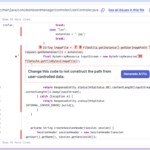Open source supply chain faces security issues

The open source software supply chain shows signs of 'AppSec exhaustion,' with organizations showing diminished engagement in security practices and struggling to meet vulnerability management goals, according to a new report.
The study from Snyk, based on a survey of 453 professionals across application development and security, shows that open-source security is more important than ever, as hackers have recognized the efficiency of targeting open-source software as a single entry point to multiple orgs.
New platform lets developers build more accurate AI apps faster

High-quality retrieval is key to delivering the best user experience in AI search and retrieval-augmented generation (RAG) applications.
Knowledge platform Pinecone has announced new vector database capabilities combined with proprietary AI models to help developers build more accurate AI applications, faster and more easily.
How RISC-V standards are changing the world [Q&A]

You may have heard of RISC-V -- usually pronounced 'risk-five' -- it's an instruction set architecture originally designed to support computer architecture research and education but which has evolved to become a standard open architecture for industry.
We spoke to Calista Redmond, CEO of standards body RISC-V International to find out more about the latest developments.
Use of GenAI in development raises security concerns

Most developers (85 percent) and security teams (75 percent) have security concerns over relying on GenAI to develop software.
A report from Legit Security, based on a survey of over 400 security professionals and software developers across North America, finds 96 percent of security and software development professionals report that their companies use GenAI-based solutions for building or delivering applications.
New platform protects organizations by assuming they've been breached

Most organizations now recognize that some form of cybersecurity breach is a matter of when rather than if. So why not just assume that the site has been breached in the first place?
That’s exactly what Tide Foundation has done with its new platform. TideCloak is an identity, immunity, and access management system that starts with a 'breach assumed' approach.
AI degradation -- what is it and how do we address it? [Q&A]

Many in the industry believe that AI is degrading because it's being starved of human-generated data. This leads to models being trained on the output of older models which increases the risk of hallucinations and errors.
But how big an issue is this and what can we do to fix it? We spoke to Persona CEO and co-founder, Rick Song to find out.
New platform offers improved observability for enterprises

As the IT landscape becomes more complex it can be difficult for businesses to fully understand their risk profile and to ensure that they're getting the most from their investments.
With the launch of a new AI-powered unified observability platform, Kloudfuse aims to deliver improved anomaly detection and consolidated metrics, logs, traces, real user monitoring, continuous profiling, and more in a unified observability data lake.
Why DevOps teams are shifting to platform engineering [Q&A]

Software development has become increasingly demanding in recent years often driven by underlying infrastructure complexities.
This is leading some organizations to shift towards dedicated platform engineering teams. These can help by automating repetitive tasks, enhancing security protocols, and providing seamless integration across diverse systems. This in turn enables developers to focus on their core role of building applications.
Free tool helps find vulnerabilities in Microsoft Power Platform code

A new free discovery and lightweight attack surface assessment tool for Microsoft Power Platform aims to address the growing challenge of low-code/no-code (LCNC) shadow engineering.
The tool from Nokod Security offers visibility into LCNC assets created by citizen developers to help security teams know and understand the scale and presence of security risks.
Software supply chain attacks and how to deal with them [Q&A]

Software supply chain attacks have increasingly made the headlines in recent years. They occur when attackers change the code in third-party software components in order to compromise the applications using them.
These attacks can be used to steal data, corrupt systems or move laterally through networks. We spoke to Ansh Patnaik, chief product officer at CyCognito, to learn more about this type of attack and how to combat it.
Third-party JavaScript tags put security at risk

While businesses understand that third-party JavaScript tags collect information, only 13 percent are confident they understand what information they collect and only 26 percent are aware that tags can leak their private user data to other organizations.
A new report from the Jscrambler platform for client-side protection, with research conducted by Dimensional Research, shows 97 percent of respondents say they know that third-party tags collect sensitive or private information regularly.
Good observability drives productivity for developer and ops teams

A new report from Splunk looks at the role of observability within today's increasingly complex IT environments.
Based on a survey of 1,850 ITOps and developer professionals, it finds enterprises with good observability resolve issues faster, boost developer productivity, control costs and improve customer satisfaction. Due to such benefits, 86 percent of all respondents plan to increase their observability investments.
Why it's critical to secure your APIs [Q&A]

APIs are essential to the smooth running of the internet, allowing the seamless transfer of information between applications and services.
Of course all of this happens behind the scenes but that's not to say that APIs should be ‘out of sight out of mind'. We spoke to Mayur Upadhyaya, CEO at APIContext, to learn more about API Security and the importance of APIs in general.
New tools help ensure quality of AI-generated code

Using AI can increase the speed of code development, but it comes with an increased risk of bad code seeping into codebases.
Clean code solutions company Sonar is releasing two new features, Sonar AI Code Assurance and Sonar AI CodeFix. These deepen Sonar's commitment to improving the developer experience and increasing developer productivity to support the delivery of better code.
Software architecture in the age of AI [Q&A]

Does AI impact software architecture? Or does software architecture impact AI? The answer of course is both, but how much of an overlap is there between the two?
To find out we spoke to Mike Loukides, vice president of emerging tech content at O'Reilly, about how software architects can work with AI and avoid its more negative effects.
Recent Headlines
Most Commented Stories
BetaNews, your source for breaking tech news, reviews, and in-depth reporting since 1998.
© 1998-2025 BetaNews, Inc. All Rights Reserved. About Us - Privacy Policy - Cookie Policy - Sitemap.